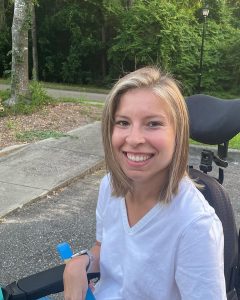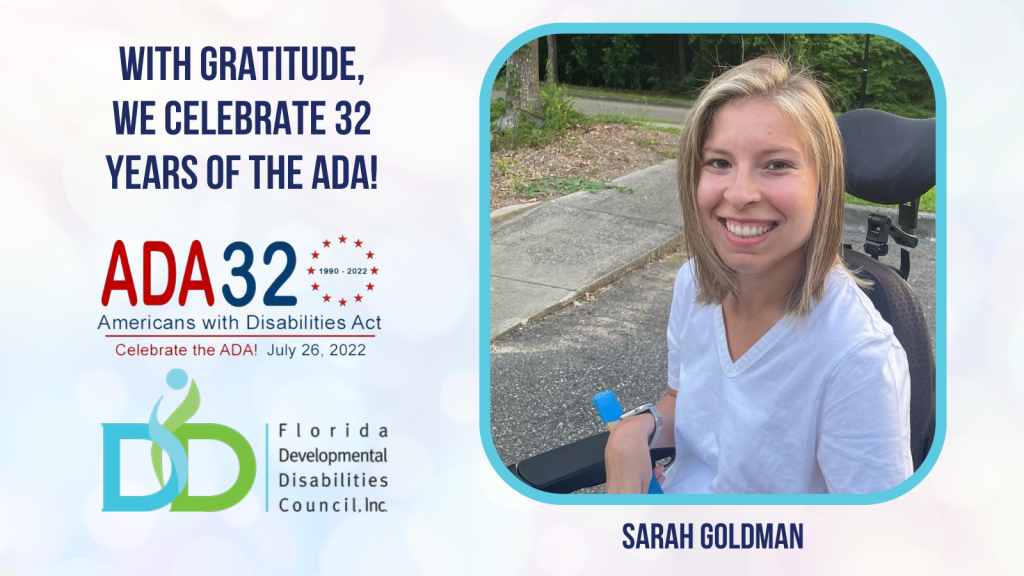
I was born into “generation ADA,” which is anyone born around or after the time the Americans with Disabilities Act (ADA) passed in 1990. I am fortunate to benefit from having curb cuts for my wheelchair, have the ability to ride almost any form of public transportation with few barriers, and attended and graduated from a public university having been 100% accommodated on campus both within and outside the classroom. I certainly don’t take any of that for granted.
This week, the ADA will turn 32 years old, but is it showing its age?
Why do I still have to call nail or hair salons to find out if they are wheelchair accessible because they still have steps to enter in?
Why doesn’t every building provide equal access such as an automatic door opener so that those with disabilities don’t have to yank heavy doors open while navigating their wheelchair?
Why don’t apartment buildings in Florida that are three floors or less not require an elevator?
Why is it difficult for individuals with disabilities to often get hired when the ADA protects against disability discrimination from employment?
Perhaps it is because we may need minimal accommodations to be successful. Perhaps employers are fearful of hiring individuals with disabilities because of pre-conceived stereotypes.
Not long ago, I was at a doctor’s office and the doctor looked at me sitting in my wheelchair and then looked at my caregiver and said “what’s wrong with her?”
Boldly, speaking for myself, I said “I have cerebral palsy.”
“What’s wrong with her?” is the lens through which society has been viewing individuals with disabilities for the past 32 years. This model views disabled people as a societal burden that suck up government resources. It often claims disabled people and their need for their mobility aids as the problem.
What if we flipped the view where the issue is not the person with the disability, but with society? What if we had a model that viewed disability not as an individual problem but as a social problem caused by outdated or non-existent policies, practices, and attitudes?
As we navigate COVID-19, the United States is practicing this type of model. Individuals are working from home, attending school online, and have telehealth doctor’s visits. These are reasonable accommodations individuals with disabilities have been requesting for years. It took a pandemic affecting everyone to make these accommodations the “new normal.”
What if we had a model that focused on inclusion for everyone; one that had universal design of buildings or accessible automatic transportation so that everyone could navigate equally and successfully?
My life, and the lives of others who are disabled, depend on these advances. I am tired of being seen as a problem. Tired of having to plead for accommodations. I want to be able to go out with my friends without calling ahead to confirm accessibility. As much as I can portray to be as “non-disabled” and try to live a “normal life,” the reality is I won’t and never will be able to.
It is society that needs to accept and accommodate us. Construct buildings that meet standards with universal design features. Include technology as a standard part of designs; use smartphone technology when installing or replacing light switches, thermostats, door locks and more. Universal… what may be an accommodation for people with disabilities may also provide benefits to others. It is an equal playing field for us all.
In these next 32 years, I hope to run for state office so that those with disabilities can bring their voices and experiences to the table as an elected official in Tallahassee. And we absolutely deserve a seat at the table. As some of my favorite disability rights activists say, “nothing about us without us.”
For now, we need society to step up. Are you going to choose to blame the individual for needing access or are you going to help advocate for the societal benefits of universal accessibility, inclusion and equality?
Over the next 32 years, I hope society chooses the latter.
Sarah Goldman is the Director of Administration and Youth Initiatives for the Florida Independent Living Council and a member of the Florida Developmental Disabilities Council.
